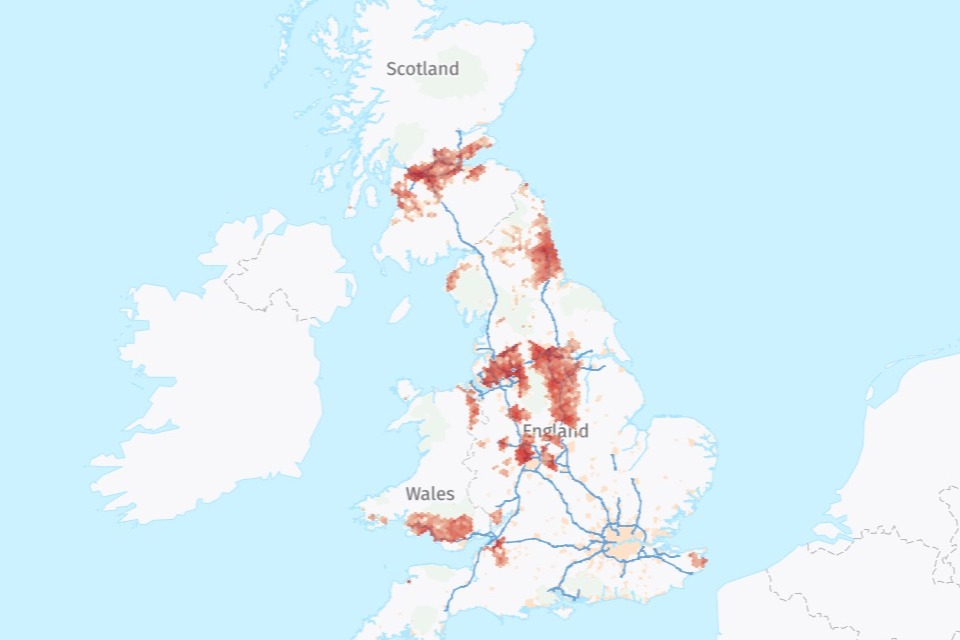Project explores potential demand for mine water heat
Research has been carried out by the Coal Authority and Ordnance Survey to map the potential demand for mine water heat projects in Great Britain.

Ordnance Survey and the Coal Authority have collaborated on an exciting project to understand the demand for heating across Great Britain’s coalfields, with a view to promoting and investigating how water in disused coal mines could be considered as a secure, low-carbon heat source to support former mining communities.
The project explored the types of buildings and the demand for heating and cooling in coalfield areas with support provided from the Department for Energy Security and Net Zero, and the Geospatial Commission.
Recovering heat from mine water is a proven technology, and could provide a sustainable, secure and low carbon heat resource for homes, offices, industry and agriculture. OS, Great Britain’s national mapping service, provided the Coal Authority with geospatial support, and accurate location and addressing data from the National Geographic Database, to quantify just how many homes, businesses and buildings could potentially benefit.

An extract from the interactive map viewer showing heating demand in Britain over recorded abandoned coal mine workings
The initial results showed that there are just over 6 million homes, and over 300,000 offices and businesses above abandoned coal mines, although it is too early to say exactly just how many of these addresses could ultimately benefit. The Coal Authority hopes that sharing this information will open up conversations with local authorities and developers who are looking into decarbonising their heating supply, and inspire them to consider mine water heat.
How mine water heating works
Mine water heat works by pumping water from flooded mine workings underground and bringing it to the surface. This water is already warm because it has been heated by geothermal energy. Heat exchangers and heat pumps on the surface recover this heat and boost the temperature further to heat up a separate, clean loop of water, transferring this heat into buildings for everyday use.
Heat pumps are paramount to taking advantage of mine water heat, as their efficiency means for every unit of electricity used to recover the heat from the mine water they output anywhere from 3 to 5 times as much heat.
After heat recovery, the now cooler mine water is returned back underground, and the water slowly filters back through the flooded mine system and warms back up ready to be used again. This circulation system can provide affordable and secure heat as well as help the UK achieve its net zero targets by 2050.
A proven concept – the mine water heating scheme in Gateshead
Since spring last year, 350 homes, council and privately owned offices, a college and an arts centre in Gateshead have been supplied with heating by a mine water heat scheme. This has demonstrated how British homes, businesses and industry can be served by the technology that recovers this heat. This makes a positive impact toward decarbonisation of heat, a major global challenge, where heating homes, buildings and heating water accounts for over 40% of Great Britain’s energy consumption and around 20% of our greenhouse gas emissions, according to 2021 Department for Energy Security and Net Zero statistics.
Over 60 local authorities in England, Scotland and Wales contain recorded mine workings and are classed as Priority 1 Levelling Up areas. Mine water heat could drive world-class innovation in these areas, supporting the road to net zero in numerous settlements and cities once founded on a history and heritage of coal mining.
John Kimmance, Managing Director of National Mapping Services at OS, said:
With so much emphasis around climate change and finding a means for a sustainable future, it is really important for OS to be able to support a low carbon heat project like this.
Our data has been used to support the effective mapping of heating and cooling demand across the coal workings areas, providing a way to quickly understand and analyse the distribution of infrastructure and development and seeing which areas could benefit most from the initiative. This project has reinforced the critical role that location data plays in supporting sustainability projects and highlights how we can drive change for the future.
Richard Bond, Innovation and Engagement Director at the Coal Authority said:
We are delighted to have worked with OS, which has been so helpful in identifying which areas would benefit the most from this secure, low carbon mine water heat initiative.
We know from schemes, such as the recently commissioned Gateshead mine heat network, that this works in the UK. The wider associated benefits of low carbon heat, levelling up, green jobs and energy security will be very positive for Great Britain in many ways.
Location data is fundamental to addressing some of the biggest challenges we face. Thanks to OS we have maximised our use of their data, paving the way for local authorities and organisations to consider mine water heat as part of their low carbon aspirations more easily. Our hope is that this will ultimately benefit the environment and the lives of thousands of people across Great Britain.
OS was able to provide the Coal Authority with its authoritative data and the dedicated expertise of a specialist employee thanks to the Public Sector Geospatial Agreement.
The data from this new project can be viewed on the mine water heat tab of the Coal Authority interactive map viewer.
For media enquiries contact the community response team
200 Lichfield Lane
Mansfield
Nottinghamshire
NG18 4RG
Email [email protected]
Telephone 0800 288 4211
For emergency media enquiries (out of hours) call: 0800 288 4242.
Only urgent media calls will be attended to.